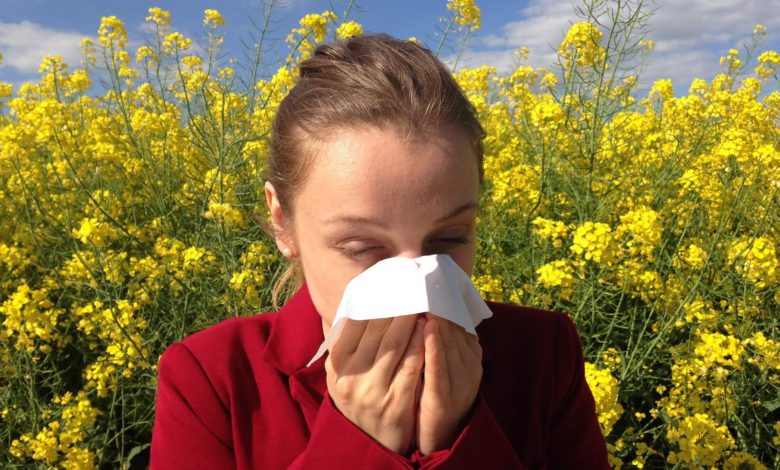Causes and Triggers of Allergy

Nasal congestion from allergies is a common problem. Unfortunately for allergy sufferers, many environmental factors can cause a trigger. These are known as “allergens” and they can cause your body’s immune system to overreact.
– Grass
– pet hair
– Dust mites etc.
Although these environmental factors seem harmless, they can lead to serious health risks for allergy sufferers. Your immune system protects you against viruses and harmful bacteria by developing a defense mechanism.
Anaphylaxis
Although the type of anaphylaxis allergy reaction is rare, this allergic reaction, which is quite severe, affects the whole body health. Although anaphylaxis type of allergic reaction can be fatal, it occurs rapidly. It causes the tissues to release histamine, along with other substances that cause breathing problems and other symptoms. This reaction occurs when protein is released from some white blood cells. Although this allergic reaction is seen in all age groups, it is more common especially in adult women.
Symptoms;
- Abdominal pain
- Dizziness
- Difficulty swallowing
- Swelling of the face
- Unconsciousness
Asthma
As with allergic reactions such as anaphylaxis, asthma can be life-threatening in severe cases. Asthma often causes the airways to become inflamed and tight, causing symptoms such as wheezing, coughing, and shortness of breath.
The relationship between asthma and allergies is complex and the two conditions often appear to be related, as many people with asthma also experience nasal allergy symptoms.
Hay fever
- Sneezing
- Runny or stuffy nose
Itchy eyes, red, swollen, watery eyes – a condition known as allergic conjunctivitis
Food allergies: You may feel tingling in your mouth. There may be swelling of the tongue, lips, throat or face.
Eczema: Also known as atopic dermatitis, it is a skin disease. Most types of eczema are not allergies. However, the disease can flare up when there are factors that cause an allergic reaction.
What Are Allergy Triggers?
Since allergens are potentially ubiquitous, it’s easy to get in touch. Dust, playing with your pet, or being outside during certain seasons of the year can trigger allergic symptoms.
- Do not touch
- Swallowing or inhaling
Dust Mites
Dust mites are among the most common allergy triggers. These microscopic creatures live on human skin contained in house dust. They like hot, humid places and even found carpets, curtains, upholstered furniture and stuffed animals in clean homes.
Dust mites show allergic symptoms such as nasal discharge, itching, continuous sneezing, shortness of breath, wheezing, redness of the eyes, and tearing.
Pollen
Pollen is the cause of seasonal allergies. It is carried in the air and helps fertilize and spread grasses, weeds and trees. Pollen prevalence can be estimated by season, but pollen numbers vary from year to year and from region to region. Although pollen triggers can trigger asthma patients, they can cause sinuses, lungs, and skin damage.
Your Body’s Response to Allergens
When an allergen enters your body, your immune system reacts and starts producing antibodies. It can produce antibodies so specific that they can only target certain types of pollen. When the immune system detects an allergen, it produces more of the appropriate antibodies.
These antibodies are single-targeted, each targeting only one type of allergen.
You can come into contact with allergens in many ways: through the skin, eyes, nose, mouth or stomach… This can cause blockage of your sinuses, inflammation of your skin, difficulty breathing or stomach problems.
Your allergy attacks can be mild and irritating, more severe, and even life-threatening. It all depends on how your body reacts and how much the allergen gets into your system.
If your allergy is severe, you may have a serious reaction called anaphylaxis. Some cases can be life-threatening and require immediate attention.
Your body’s immune system overreacts to substances called allergens that are usually not harmful. There may be urticaria, itching, swelling, sneezing, and a runny nose.
Histamine Release
When the antibodies find an allergen, they begin to stimulate mast cells. Mast cells are blood cells that secrete more chemicals, including histamine. Histamine causes inflammation, meaning small blood vessels leak. This causes the fluid to escape, which causes a runny nose, swelling of the nose, and congestion.
If one or both parents have allergies, children from genetic coding are more likely to also suffer from nasal allergies and allergies.
Are Allergic Reactions Inherited?
Like many other health issues, whether you have allergies or not is determined by your parents. When a parent is prone to allergic reactions, a child has about a 50% chance of getting them, and when both parents are affected, the child’s risk rises up to 80%.
However, anyone can experience allergic reactions regardless of race, age, gender, or any other condition. However, children tend to be more affected than adults.
Allergy Prevention
Since there is no way to completely cure allergies, the best way to find relief and improve your health is to find ways to prevent allergic reactions.
- Avoid allergy triggers whenever possible.
- Check for any reports of pollen or mold before going outside. If levels are high, consider wearing a face mask.
- During allergy season, take a shower before going to bed so you can prevent pollen from sticking to your hair.
- Keep the windows closed.
- Many people use nasal spray to alleviate allergies.
Nasal Sprays and Other Medications
Over-the-counter (OTC) medication can help control symptoms of allergic reactions. Such medicines include antihistamines and decongestants. These drugs come in different forms such as pills or capsules, liquids, eye drops or nasal sprays.





